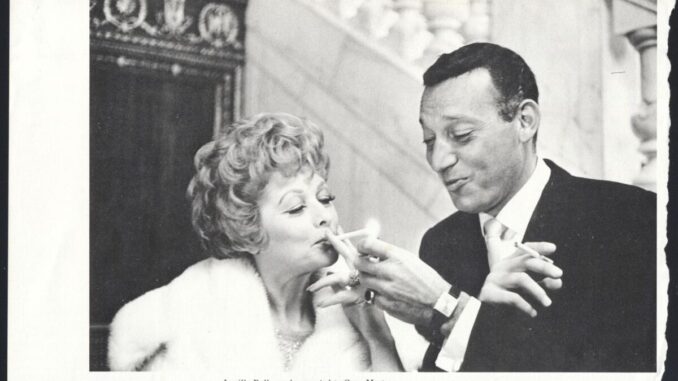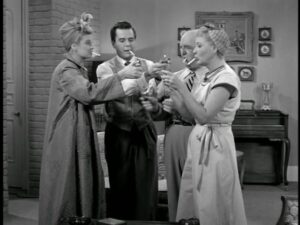
Introduction
In the golden age of television, sponsorship was king. Back when brands and TV shows were more closely tied, it wasn’t uncommon for actors to be seen endorsing products right on their shows. However, Lucille Ball, the pioneering star of I Love Lucy, defied this norm in a way that still intrigues fans. Even though I Love Lucy was famously sponsored by a major cigarette brand, Ball didn’t smoke that brand herself. Let’s explore why this Hollywood icon chose differently, how sponsorships shaped early TV, and the fascinating legacy of Lucille Ball’s relationship with her sponsor.
What Was ‘I Love Lucy’ Really Like Behind the Scenes?
Lucy Ricardo was a character millions adored, but the off-screen Lucille Ball was a complex, determined woman with her own preferences. Although cigarette commercials and brand placements were common in I Love Lucy, Ball had a personal smoking choice that didn’t align with her show’s sponsor.
Why Cigarette Sponsorship Was So Big in the 1950s

In the 1950s, tobacco companies dominated the advertising world, pouring funds into sponsorships. Cigarette brands often sponsored popular TV shows, helping them reach mass audiences. For I Love Lucy, which premiered in 1951, the show’s partnership with Philip Morris was instrumental in its production and widespread success. With the cigarette brand as a lead sponsor, their commercials and logos were displayed prominently during episodes.
Lucille Ball’s Personal Preference: Why She Chose a Different Brand
Despite Philip Morris being I Love Lucy’s official sponsor, Ball wasn’t a fan of their cigarettes. She preferred Chesterfield cigarettes instead. This decision was unusual at the time, as actors often publicly used products from their sponsors. However, Lucille Ball’s strong personality and personal preferences led her to stick with Chesterfields, showing that even Hollywood stars didn’t always conform.
How Did Philip Morris React to Lucille’s Brand Choice?
While Philip Morris might have hoped for a more dedicated brand ambassador, Lucille Ball’s choice to smoke Chesterfields didn’t create much public tension. In fact, the brand’s association with I Love Lucy remained strong, and many viewers never knew about Ball’s personal preference. It’s a testament to Ball’s influence and the power of her image that the sponsorship continued successfully despite her behind-the-scenes choice.
Did Desi Arnaz Also Have a Brand Preference?
Desi Arnaz, Ball’s husband and co-star on I Love Lucy, was deeply involved in the production of the show. Known for his iconic portrayal of Ricky Ricardo, Arnaz played a significant role in securing sponsorship deals, including the one with Philip Morris. However, there’s no record indicating that Arnaz preferred a specific cigarette brand. His focus remained largely on making the show a success rather than navigating brand preferences.
The Iconic Philip Morris Advertising Integration in ‘I Love Lucy’
With Philip Morris as the sponsor, I Love Lucy incorporated the brand in numerous ways. From promotional appearances to cigarette packs displayed in the set, Philip Morris products became part of the I Love Lucy universe. Commercials featuring Ball and Arnaz also aired frequently during episodes, further cementing the association between the show and the cigarette brand.
Did Lucille Ball Face Pressure to Smoke Philip Morris Cigarettes On-Screen?

While Lucille Ball never had to smoke on screen for her role as Lucy Ricardo, there’s little doubt that the sponsorship with Philip Morris brought with it certain pressures. Given the heavy integration of the brand into the show’s marketing, there may have been an expectation for Ball to align more closely with Philip Morris, though she continued to smoke Chesterfields in private.
Cigarette Sponsorships: A Powerful Force in Early TV
Cigarette companies played a huge role in early television by offering financial support in exchange for exposure. In return, TV shows like I Love Lucy gave brands unparalleled visibility. This era saw cigarettes become an inescapable part of pop culture, with actors often endorsing them directly within their shows.
Lucille Ball’s Health: How Smoking Affected Her Life and Career
Sadly, smoking was a common habit among many Hollywood stars of Ball’s generation, including Ball herself. Although Ball’s career continued to flourish well into her later years, smoking took a toll on her health. Ball’s preference for Chesterfield cigarettes was a personal choice, yet her smoking habit may have had long-lasting impacts on her health, as it did for many stars of her era.
How Did Fans React to Lucille Ball’s Smoking?
In the 1950s, smoking was far more socially accepted, and seeing stars like Lucille Ball with cigarettes didn’t carry the stigma it does today. Fans rarely, if ever, voiced concerns about her habit, and the connection between I Love Lucy and Philip Morris likely normalized smoking even more. This lack of awareness reflects a time when the risks of smoking weren’t widely publicized.
Why Was Lucille Ball’s Choice a Reflection of Her Independent Spirit?
Ball’s decision to smoke Chesterfields over Philip Morris cigarettes symbolizes her independent spirit. Despite being one of the most influential figures in Hollywood, she was unwilling to conform fully to the expectations of her sponsors. This quiet defiance highlights her strength as both an actress and a businesswoman, setting her apart from other stars who may have simply gone along with sponsorship demands.
The Shift in TV Sponsorships and Advertising Regulations
Over time, the relationship between TV shows and their sponsors evolved. In the late 1960s, regulations became stricter, and the health risks of smoking were publicly acknowledged. As a result, cigarette sponsorships waned, and actors were no longer required to endorse products that conflicted with their personal preferences. This shift likely would have allowed Ball to avoid brand conflicts had her career spanned into this era.
Lucille Ball’s Legacy: An Icon Who Stayed True to Herself
Ball’s influence in Hollywood went far beyond her comedic genius. Her choice to smoke her preferred brand underscored her commitment to authenticity. In a world where celebrity endorsements are often driven by contracts, Ball’s subtle rebellion demonstrated her dedication to being herself, regardless of expectations.
Why Fans Still Love Lucille Ball for Her Authenticity
Today, fans remember Ball not only for her humor but for her ability to stay true to herself. Her choice in cigarettes might seem minor, but it’s an enduring reminder of her independent spirit. Ball’s legacy continues to inspire viewers and actors alike to follow their own paths, regardless of industry pressures.
How Modern TV Sponsorship Differs from the Golden Age
The way sponsorships work in television today has changed dramatically. While brands still play a role, the days of total integration, where actors publicly endorsed products from their sponsors, have largely faded. Instead, advertisers now rely on less direct methods, like product placement or digital marketing, to reach audiences.
Conclusion
Lucille Ball’s choice to smoke Chesterfield cigarettes instead of the sponsor-backed Philip Morris brand may seem small, but it speaks volumes about her character. Her refusal to conform to every expectation made her a unique figure in Hollywood and preserved her authenticity. I Love Lucy remains an iconic show, not just for its humor but also for the ways it reflects the personal choices and integrity of its stars.
FAQs
1. Why did Lucille Ball prefer Chesterfields over Philip Morris cigarettes?
Lucille Ball had a personal preference for Chesterfield cigarettes, a choice she held onto despite the sponsorship deal with Philip Morris.
2. Did Desi Arnaz have a cigarette brand preference?
There’s no recorded preference for a specific brand by Desi Arnaz, as his focus was more on production and the show’s success.
3. Were cigarettes commonly advertised on TV shows in the 1950s?
Yes, cigarette companies were among the biggest sponsors, and it was common for them to support popular TV shows like I Love Lucy.
4. How did smoking affect Lucille Ball’s health?
Like many stars of her era, smoking took a toll on Ball’s health later in life, though its impact on her career was minimal.
5. How did TV sponsorship change over time?
In the 1960s, new regulations and a greater awareness of health risks led to a decrease in cigarette sponsorships and a shift toward less direct advertising methods.